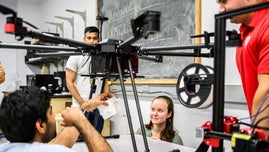WPI granted $1.6M to develop wound-care app
 Courtesy
From the left, WPI researchers Emmanuel Agu, Diane Strong, Bengisu Tulu, Shubham Jain, a master's student in robotics engineering, Peder Pedersen, and Dachao Sun, a former Ph.D. student in computer science, discuss an app that will monitor chronic wounds, like the simulated diabetic foot ulcer on the table.
Courtesy
From the left, WPI researchers Emmanuel Agu, Diane Strong, Bengisu Tulu, Shubham Jain, a master's student in robotics engineering, Peder Pedersen, and Dachao Sun, a former Ph.D. student in computer science, discuss an app that will monitor chronic wounds, like the simulated diabetic foot ulcer on the table.
A team of researchers at Worcester Polytechnic Institute (WPI) have received a $1.6-million grant from the National Institutes of Health to develop a smartphone app to allow patients and caregivers to track chronic wounds, according to a press release WPI issued Wednesday.
The goal of the app, which is in the early stages of development, is to help lower costs associated with frequent doctor and hospital visits while catching serious complications associated with chronic wounds, including hospitalization and amputation.
Chronic wounds, which frequently affect diabetic patients, are a major problem in the United States. WPI cited a 2017 study finding chronic wounds affect 5.7 million people in the U.S., or about 2 percent of the population, at an annual cost of $20 billion.
Led by Emmanuel Agu, associate professor of computer science and coordinator of WPI’s Mobile Graphics Research Group, the group of researchers is designing the app for patients and caregivers, including visiting nurses, who need to regularly check the status of potentially dangerous wounds in the home environment. It will make patients more involved in their own care, cut down on unnecessary doctor visits, and issue alerts when an emergency trip to the doctor or hospital is necessary, according to Agu.
Patients or their caregivers will use the app to photograph chronic wounds with a smartphone. Machine learning algorithms built into the app will measure wound assessment metrics, including size, depth and color, which indicate how the wound healing is progressing. The algorithms will compare the readings over time to determine if the wound is shrinking or expanding, or if there are other changes, like darkening tissue, which could indicate a growing infection or other complication, according to WPI.
The app will compute a healing score to tell the patient whether the wound is getting better, is unchanged, or is worsening. The app will suggest one of three actions: stay the course, consult a wound specialist for advice regarding treatment, or seek immediate care.
The new wound app is an evolution of work Agu and his research team completed for Sugar, an app designed to help people with diabetes track and manage their weight and blood sugar levels, and photograph and assess the status of any chronic foot ulcers.
Now, Agu and his team will build on the wound assessment component of Sugar, which was developed with a $1.2-million grant awarded in 2011 by the National Science Foundation. While Sugar focused exclusively on diabetic wounds on the feet and legs, the new app is expected to one day be expanded to assess a broader array of chronic wounds, including arterial, venous and pressure ulcers, also known as bed sores, WPI said.













0 Comments